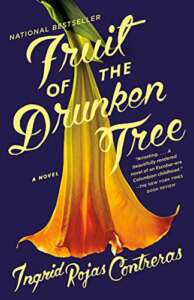 Discussion questions for Fruit of the Drunken Tree by Ingrid Rojas Contreras
Discussion questions for Fruit of the Drunken Tree by Ingrid Rojas Contreras
- In an interview on NPR, Contreras says: “And I think that [the coexistence of beauty and violence] was an inspiration, too, when writing this novel – that duality of living somewhere very beautiful and living somewhere where violence is riding underneath the surface.” Did that come through in the writing?
- The New York Times reviewer wrote that: “Although this debut novel is inspired by the author’s personal experiences (as noted in an afterword), you don’t need to have grown up in Bogotá to be taken in by Contreras’s simple but memorable prose and absorbing story line.” Do you agree? Were you able to relate to characters in circumstances so different from those you may have experienced in your own life?
- In an interview with Bustle Contreras says: “[Petrona] is caught between her loyalty to Chula’s family and the loyalty demanded by the guerillas.” Is Petrona loyal to the Santiagos? Is demanded loyalty really loyalty?
- The Bustle interviewer says: “The Fruit of the Drunken Tree takes its title from an extremely poisonous tree colloquially named ‘el Borrachero’ (‘the drunk’). Chula’s mother plants this tree in front of their house, and Contreras sees the tree as an overarching metaphor for Colombia. ‘It’s so lush, and it’s so wild, and it’s so beautiful,’ she says. ‘But there’s a danger that lies underneath.’” Could you sense that danger throughout the novel? If not, when did the danger become clear to you?
- What did you think about the author’s decision to have the book narrated mostly by a 7-year-old? Did you find Chula’s perspective believable as a 7-year-old? Reflect on these thoughts:
- Publisher’s Weekly’s reviewer calls Chula “ implausibly precocious”.
- Kirkus‘s reviewer wrote: “Choosing a young girl to deliver a perspective on political chaos and terror is a mixed blessing in Contreras’ debut… Her chief narrator is 7-year-old Chula Santiago, whose dreamy insights and immaturity both intensify and limit what the narrative can offer.”
- In the interview with Bustle, Contreras says: “when you are a child there are things that you can only scratch the surface of, especially if they’re political in nature, and one of the joys of writing this novel was that I was able to both see in the shoes of a child and as an adult.”
For more questions, check out the publisher’s resources.

